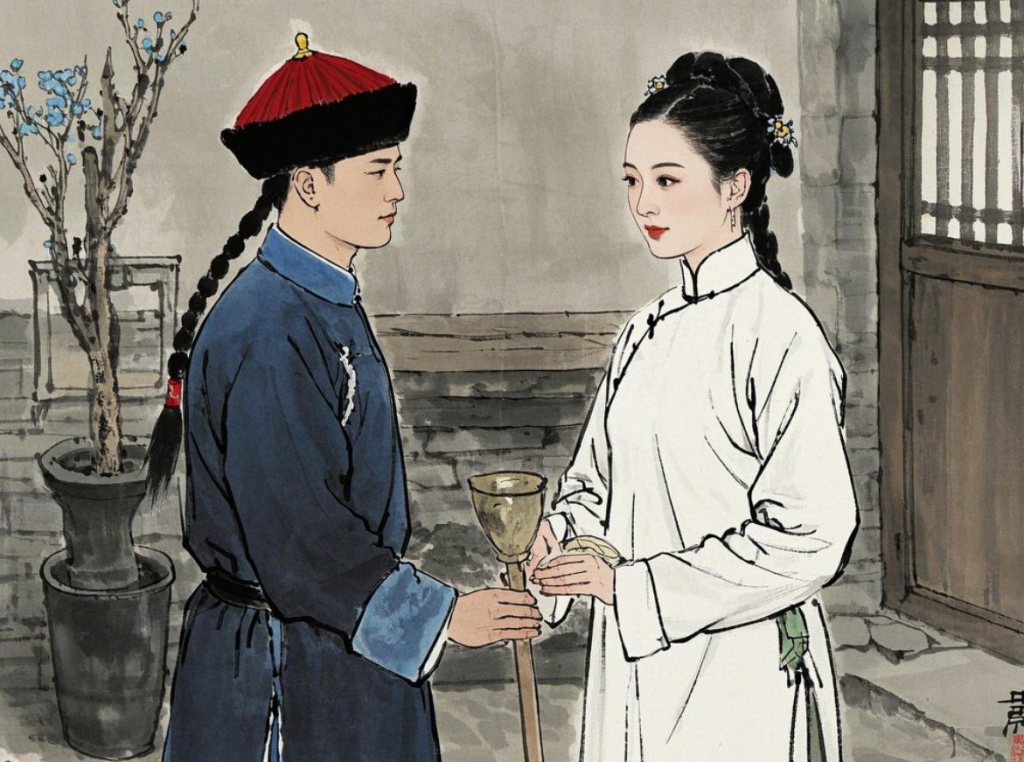n the 35th year of the Qianlong reign (1770), in the picturesque water town of Liuhe in Jiangdu County, Yangzhou Prefecture, life was peaceful and prosperous. Among the town’s respectable merchants was Zhou Wenli, a diligent cloth trader who lived modestly yet comfortably with his wife, Lin Xiuniang. Lin was renowned for her beauty—fair-skinned with delicate features—and was the envy of many in the town. The couple shared a quiet, affectionate life, but this serenity would soon be shattered by a sinister plot.

A Deceptive Scheme Unfolds
One autumn evening, three days after Zhou Wenli left for Suzhou on a business trip, Lin Xiuniang was startled by an urgent knock at her door. It was Zhao Mingde, the town’s private tutor, clutching his forehead and wailing in pain. “Madam Zhou, I was struck by a stone thrown by mischievous children. May I trouble you for some water to clean my wound?”
Feeling sympathy for the bleeding scholar, Lin invited him in. Little did she know, she was stepping into a well-laid trap. As soon as Zhao entered the courtyard, another man, a young scholar named Chen Zian, conveniently walked by. Chen, a newly minted successful candidate of the imperial examination, was a handsome and eloquent gentleman from Hangzhou, admired by many local women. Upon seeing Zhao’s bloody face, Chen dramatically exclaimed, “Such audacity! A crime in broad daylight!” His outburst drew the attention of nosy neighbors, setting the stage for scandal.
The entire encounter had been orchestrated. Zhao Mingde had long lusted after Lin Xiuniang but had never dared to act due to her husband’s vigilance. Chen Zian, on the other hand, had boasted drunkenly that Jiangnan women were superior to those of Yangzhou. Zhao, sensing an opportunity, goaded him: “There is a beauty in Liuhe, but her husband guards her like a hawk.” Thus, the two schemers hatched their vile plan.
Once inside the Zhou residence, Zhao suddenly tore his robe and screamed, “Why does Madam Zhou assault me?” Chen immediately supported his claim: “I saw it with my own eyes! This woman behaves inappropriately!” Before Lin could protest, the damage was done. With her reputation at stake, she had no choice but to submit to their coercion.
A Merchant’s Calculated Vengeance
For half a month, Chen Zian frequently visited the Zhou residence under the guise of “resolving the misunderstanding.” He lavished Lin Xiuniang with gifts and sweet words, exploiting her vulnerable state. Eventually, her resistance faltered, and she succumbed to his advances.
But their secret did not stay hidden for long. Zhao, emboldened by his success, spread the scandal in the form of a lewd street ballad. Soon, even children were singing: “Madam Zhou, a beauty so grand, welcomes the scholar’s gentle hand…” The news reached Zhou Wenli in Suzhou, prompting him to rush back home.
Instead of confronting his wife in a fit of rage, Zhou Wenli took a different approach. He maintained an eerie calm, treating Lin Xiuniang with uncharacteristic warmth and even inviting Chen Zian for a lavish feast. Over drinks, he offered Chen a lucrative share in his cloth business, which the greedy scholar eagerly accepted.
But Zhou had a plan. The following spring, an anonymous report reached the county magistrate, accusing Chen Zian of bribing exam officials. The Qing court was cracking down on corruption, and when officials raided Chen’s home, they found damning evidence hidden in a secret compartment. He was swiftly stripped of his scholarly rank and sentenced to exile in the frigid wastelands of Ningguta.
On the day Chen was led through town in shackles, Zhao Mingde was found dead in his home, allegedly from eating a poisoned bun. But rumors swirled—some swore they saw Zhou Wenli delivering a basket of pastries to Zhao’s doorstep the night before. As for Lin Xiuniang, she fell “gravely ill” and was discreetly sent to a remote nunnery, never to be seen again.
The Lingering Mystery
This scandalous case became the talk of Jiangnan, yet no concrete evidence ever surfaced against Zhou Wenli. Some viewed him as a ruthless avenger, others as a man pushed beyond the limits of endurance. What is certain is that he had sought counsel from a famous legal strategist in Suzhou—one renowned for designing “lawful revenge.”
Years later, in 1780, a veiled woman was seen praying at Lingyin Temple in Hangzhou, her features resembling those of a once-celebrated beauty. And at the Grand Canal docks, an old boatman, always wearing a wide-brimmed straw hat, bore an uncanny resemblance to a once-prosperous cloth merchant.
The Broader Implications
Beyond the intrigue, this tale reveals the grim realities of Qing dynasty society, where a woman’s reputation was so fragile that a mere rumor could destroy her life. It also highlights how, in an era where justice was often unattainable for commoners, revenge became an alternative form of redress. In a world governed by strict Confucian ethics, Zhou Wenli’s calculated retribution was as chilling as it was ingenious—a reminder that in history, justice often wears a mask.

No comments yet.